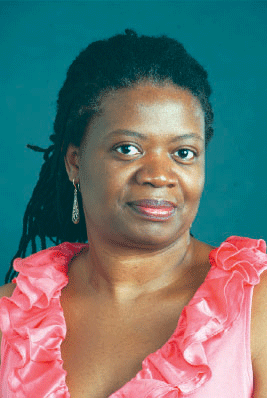Meet your professor: Otrude Moyo
Department: Social Work

February 27, 2014
Jessie Tremmel: How did you find your way into teaching?
Otrude Moyo: It’s a long story for me. It’s really a convoluted story. I never thought I would be a teacher. When I was growing up, my mom was a teacher. I never really imagined that I would be a teacher and when I graduated from my high school and was preparing to go to college after my A levels, I was given political science as an area to study. Note that the British system is different from us here, so you have to concentrate on an area. So I was given political science, and my mom says, “Where have you ever found a political science person getting a job? So you should go to teachers college, so go to normal school.” So I packed my things and went there for three days, and said, nope this is not what I want to do. I came out of that, but then I had to negotiate. One of her friends said, “Well, maybe she can go to social work.” And that’s how I discovered that there was social work. Then I shifted to become a social worker. It’s a long time coming, in terms of what I began to notice that I liked, I liked composition, I liked research, I liked also encouraging new students, so that is how I have stayed on. And I figured also, I was good at it.
JT: What brought you to Eau Claire?
OM: I was settled in my old university, at the University of Southern Maine, and you get settled and you feel like you know everyone and you know everything, so I was just itching to have a different environment. I looked around and Eau Claire had things that I really wanted at the time in my career, like the idea of student-faculty research. It is a really good fit for me.
JT: If you weren’t teaching, what would you be doing?
OM: I would be involved in something around education and it would be education of youth, education with art, but still in education. So I’m hoping, in the long run to work with non-profits that are doing citizenship engagement and human rights.
JT: What’s your favorite part about teaching?
OM: My favorite part about teaching is the 100-level classes, the interdisciplinary teaching. I like the other classes I teach, but for instance, IDIS 100, which is an interdisciplinary course, I love. I put my energy into that. Because it’s not discipline-based, you get students from across the university, and that’s a plus. But also, I am interdisciplinary oriented, in terms of thinking about women’s studies, economics, political science and sociology. Those were my areas in my doctoral education, so it really is a good fit.
JT: What are your hobbies outside of teaching?
OM: My free time is more around research, seriously, you live like that. I do not know, maybe other people have things that they do outside, but my lifestyle is my work as well. So if I’m not grading papers, if I’m not doing class preparations, I am involved in my personal research. If I’m not doing all that, then I am with my daughter, or my mom and dad in Southern Africa.
